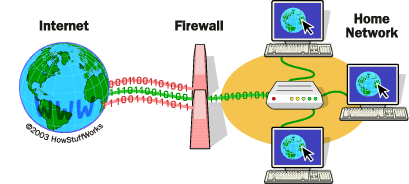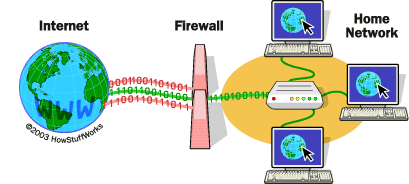SEO
Understanding How Firewalls Work To Protect Your Sensitive Data Online

There are many forms of protection that you can implement onto your computer system both at home
and at work in order to be certain that the information that you receive and share over those computer systems will be secure.

You do not want to ever allow hackers the opportunity to access the sensitive information that you have stored onto your computers,
nor do you want them to be able to access any of the data that you are sending and receiving over your computer network and the internet.
Therefore, there are many precautions that you need to take to ensure that the hardware
and software of the computer systems that you use regularly are safely secured from outsiders and will be able to continue operating optimally.
From anti-virus software to firewalls and passwords, there are many things that individuals do to keep their information private, just as it was intended to be.
Yet hackers still always seem to find a way in and make securing computer systems that much more difficult all the time.
If you do not know what a firewall is, or if you do not yet have a firewall installed on your home or work computer,
you should definitely invest in one as soon as possible in order to begin securing your systems and prevent future damage from viruses and hackers.
Read on to learn the many benefits of having a secure and strong firewall installed on each and every one of your computers in order to protect the work that you do while online.
What Firewalls Do
Just as a literal firewall will prevent fire from spreading from one building to another,
a computer firewall works in much the same way, but its specific purpose is to prevent sensitive data from getting into the wrong hands while also preventing malicious software from getting onto your computer.
Firewalls can come as pieces of hardware or software, but their job is always the same: to protect what gets to your computer and what goes out.
Firewalls will prevent your computer from being exposed to worms, malware, spyware, viruses, and hackers who may try to infect or infiltrate your system.
Many anti-virus software programs come with their own built-in firewalls for your protection, and Windows also provides one of its own.
Just be sure to properly configure your firewall so that it turns on every time you start your computer.
This will ensure a secure browsing experience all the time.
How Firewalls Work
You can determine how strict you want your firewall to be, but essentially,
what it will do is block out all types of data and programs that may be deemed unsafe for your computer.
When it comes to installing new programs, a firewall will also require your permission before doing so.
And firewalls are programmed to be able to determine what sites and programs are safe and which ones should be blocked.
This will prevent you from accidentally visiting any website that has malicious code embedded into it.
Benjamin Bernardo is an expert in all areas on internet security.
When checking out the latest in secure computer services, Benjamin often visits www.voodooping.com.
-

 Tech11 years ago
Tech11 years agoCreating An e-Commerce Website
-

 Tech11 years ago
Tech11 years agoDesign Template Guidelines For Mobile Apps
-

 Business6 years ago
Business6 years agoWhat Is AdsSupply? A Comprehensive Review
-

 Business10 years ago
Business10 years agoThe Key Types Of Brochure Printing Services
-

 Tech8 years ago
Tech8 years agoWhen To Send Your Bulk Messages?
-

 Tech5 years ago
Tech5 years ago5 Link Building Strategies You Can Apply For Local SEO
-

 Law5 years ago
Law5 years agoHow Can A Divorce Lawyer Help You Get Through Divorce?
-

 Home Improvement6 years ago
Home Improvement6 years agoHоw tо Kеер Antѕ Out оf Yоur Kitсhеn































